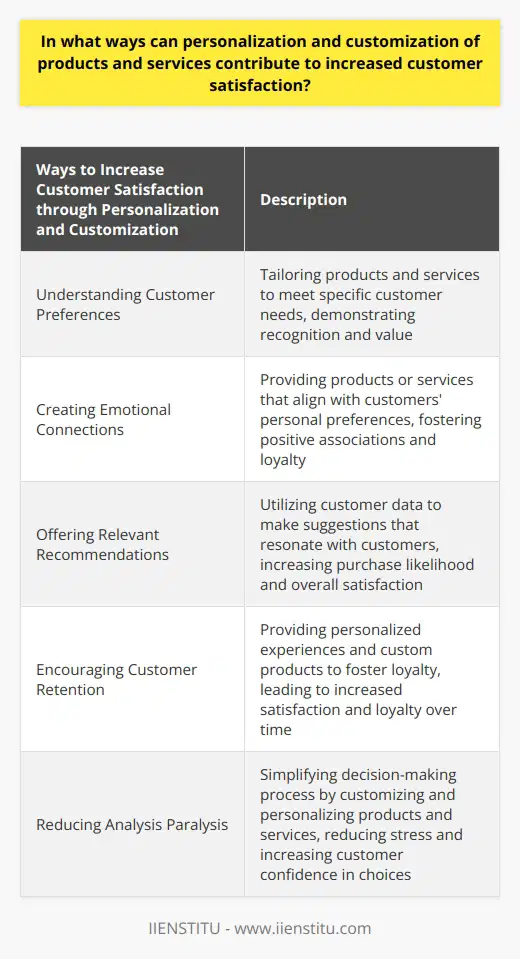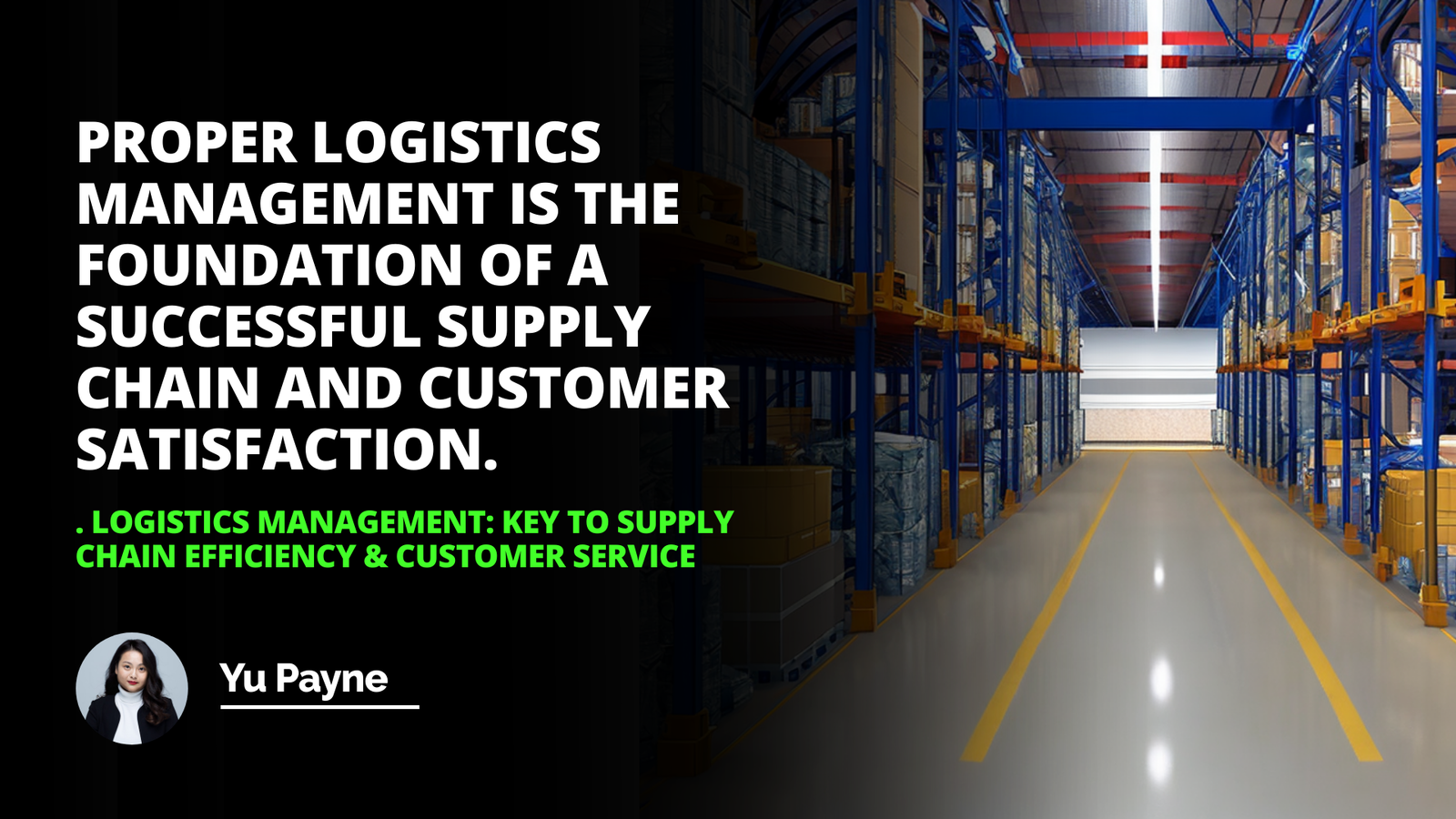
Impact of Education on Customer Satisfaction
Advantages of Education for Fostering Customer Satisfaction
Challenges of Education in Fostering Customer Satisfaction
Customer satisfaction is a significant concern for businesses. In today’s highly competitive environment, gaining and retaining customers has become more complex and challenging. That’s why it’s essential to ensure high customer satisfaction. One of the most effective ways is by educating customers about your products and services. By doing so, customers will not only be more likely to become and stay loyal to your business, but they will also be able to get more out of your product or service.
Impact of Education on Customer Satisfaction
When it comes to customer satisfaction, education is a crucial factor. It can have both positive and negative impacts on customer satisfaction.
Positive Impacts: Educating customers about your products or services can positively impact customer satisfaction. Educated customers are more likely to become and stay loyal to your business because they understand the value of your services. Additionally, educating customers will help them understand the features and benefits of your products or services and their potential limitations. As a result, customers can get more out of your product or service, thus leading to higher satisfaction levels.
Adverse Impacts: However, it is essential to note that education can also hurt customer satisfaction. If customers are given more information or the correct information, it could lead to customer satisfaction. For example, suppose you provide accurate information regarding the product or service you offer. In that case, customers may need help to use your product or service effectively. Additionally, understanding the product or service may lead to mismatched expectations, resulting in customer satisfaction and anger.
Advantages of Education for Fostering Customer Satisfaction
There are many advantages of educating customers to foster customer satisfaction:
Educating customers will help them understand your products or services more clearly, leading to a more positive user experience and, ultimately, higher customer satisfaction.
Educating customers can be used as a form of ‘pre-sales.’ Providing potential customers with the necessary information helps them make better decisions and can also help increase sales and enhance customer loyalty.
Educating customers may also encourage customer feedback and reviews, which can help improve customer satisfaction.
Challenges of Education in Fostering Customer Satisfaction
Despite the advantages, there are also challenges associated with educating customers to foster customer satisfaction. The most significant challenge is finding a way to communicate the necessary information to customers effectively. With the ever-growing complexity of technology, it cannot be easy to find ways to explain it in a way that customers will understand and be able to take action on. Additionally, educational campaigns may take time and effort to create, manage and maintain.
Conclusion: Education is an essential factor in ensuring customer satisfaction. It can positively and negatively impact customer satisfaction, so it’s necessary to ensure that customers have the correct information. By doing so, customers will get more out of your product or service, leading to higher customer satisfaction. Additionally, educating customers can help to increase sales and enhance customer loyalty. However, there are also challenges associated with educating customers to foster customer satisfaction. For example, finding the most effective way of communicating the necessary information can be difficult. Still, with the right strategies, it is possible to successfully educate customers and foster customer satisfaction.
A well-educated customer is a satisfied customer.
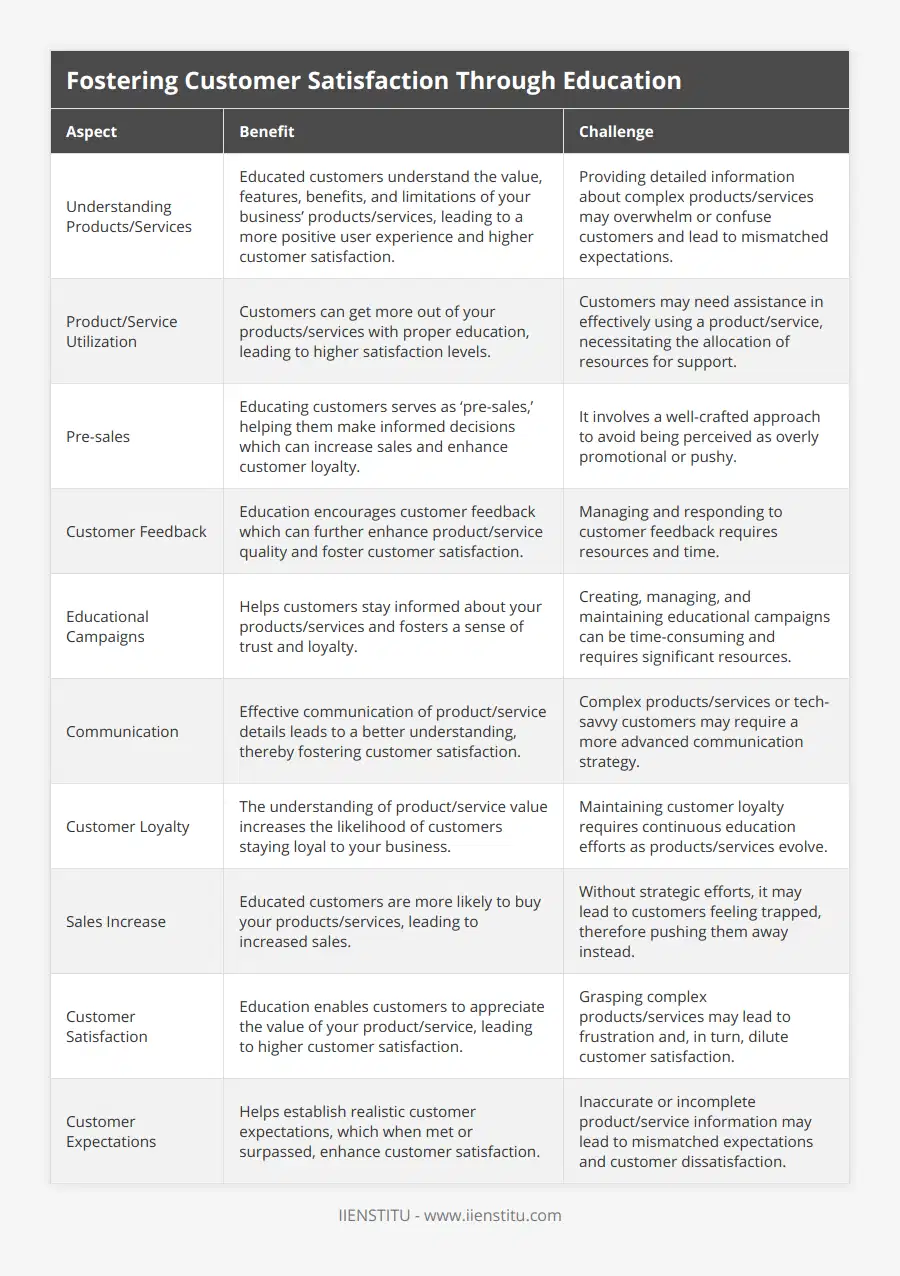
Frequently Asked Questions
How can providing education to customers help foster customer satisfaction?
Providing education to customers is a vital component of fostering customer satisfaction. When customers are educated on their interactions with a business, they are more likely to have a positive experience, ultimately leading to greater customer satisfaction. Research has found that customers who are educated about the products or services they are buying and about their company interactions experience higher levels of satisfaction overall.
One of the most common and effective methods of providing customer education is through customer service agents. Customer service agents are trained on the product and services offered by the company. They can help to bridge the gap between customer expectations and the company's capabilities. Through direct interactions with customers, agents can provide helpful information and guidance, which can help to build trust and increase customer satisfaction. Customer service agents should also be trained in problem-solving techniques and customer service skills to handle customer complaints and inquiries better while increasing customer satisfaction.
In addition, companies should provide educational materials to customers. This could include product information manuals describing a product's features, benefits, and usage and information about company policies, procedures, and processes. Enabling customers to access this information whenever they need it increases their understanding of the product or service and helps to eliminate any confusion or misconception.
Educational webinars and online tutorials are also effective ways to educate customers. By offering these educational sessions, customers can learn about the company's products or services in greater detail and how to use them more effectively. These educational opportunities also encourage customers to share their feedback and experiences, which can further strengthen the customer-company relationship.
Ultimately, providing customer education is essential to fostering customer satisfaction. By developing effective customer education materials, providing quality customer service, and offering educational resources, a company can ensure that its customers are well-informed and comfortable with their purchases, increasing customer satisfaction.
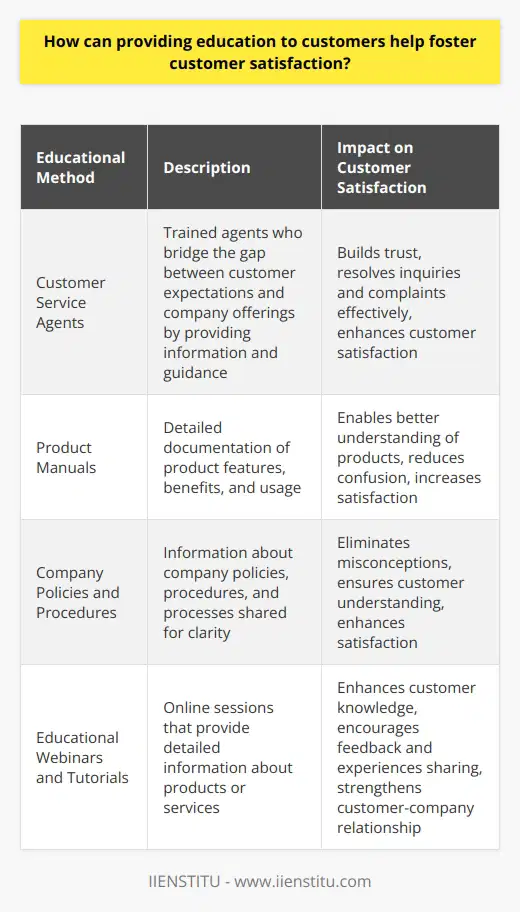
What strategies can be employed to make customer education both dynamic and engaging?
Customer education is critical for many businesses – it helps customers better understand the products and services offered, keeps them informed on the latest updates, and can create a competitive advantage among companies. As such, it is essential to ensure customer education is engaging and dynamic. Here are a few strategies to ensure customer education is both dynamic and engaging:
Tailor content to customer interests: Businesses should consider tailoring customer education content to each customer’s interests. By providing customized experiences, companies can ensure customers are more likely to engage with the content, as it is catered to their needs. Doing so may also give customers greater control over the process and positively impact the customer experience.
Incentivise learning: To further boost engagement and encourage customers to continue learning, businesses should consider offering incentives, such as discounts, rewards, and loyalty points, for completing courses or surveys. This can further motivate customers to participate and promote a long-term relationship between the customer and the business.
Use modern technology: Modern technology, such as virtual or augmented reality, allows businesses to create realistic and immersive learning experiences. This can keep customers engaged and motivated and provide a unique way of learning information.
Incorporate game elements: Incorporating game elements, such as a leaderboard, levels, and achievements, into customer education can be an effective way to engage customers. This can create a sense of competition and further incentivize customers to complete the tasks.
Please provide feedback on progress: Ultimately, providing customers with feedback/assessment on their progress as they progress through their learning is helpful for both motivation and for assessing the progress of individual customers. In addition, this can help businesses understand where customers are having difficulty and help them to personalize the customer education experience.
In conclusion, businesses should consider employing the above strategies to ensure customer education is dynamic and engaging. Doing so helps keep customers informed, motivated, and engaged throughout their customer education journey.
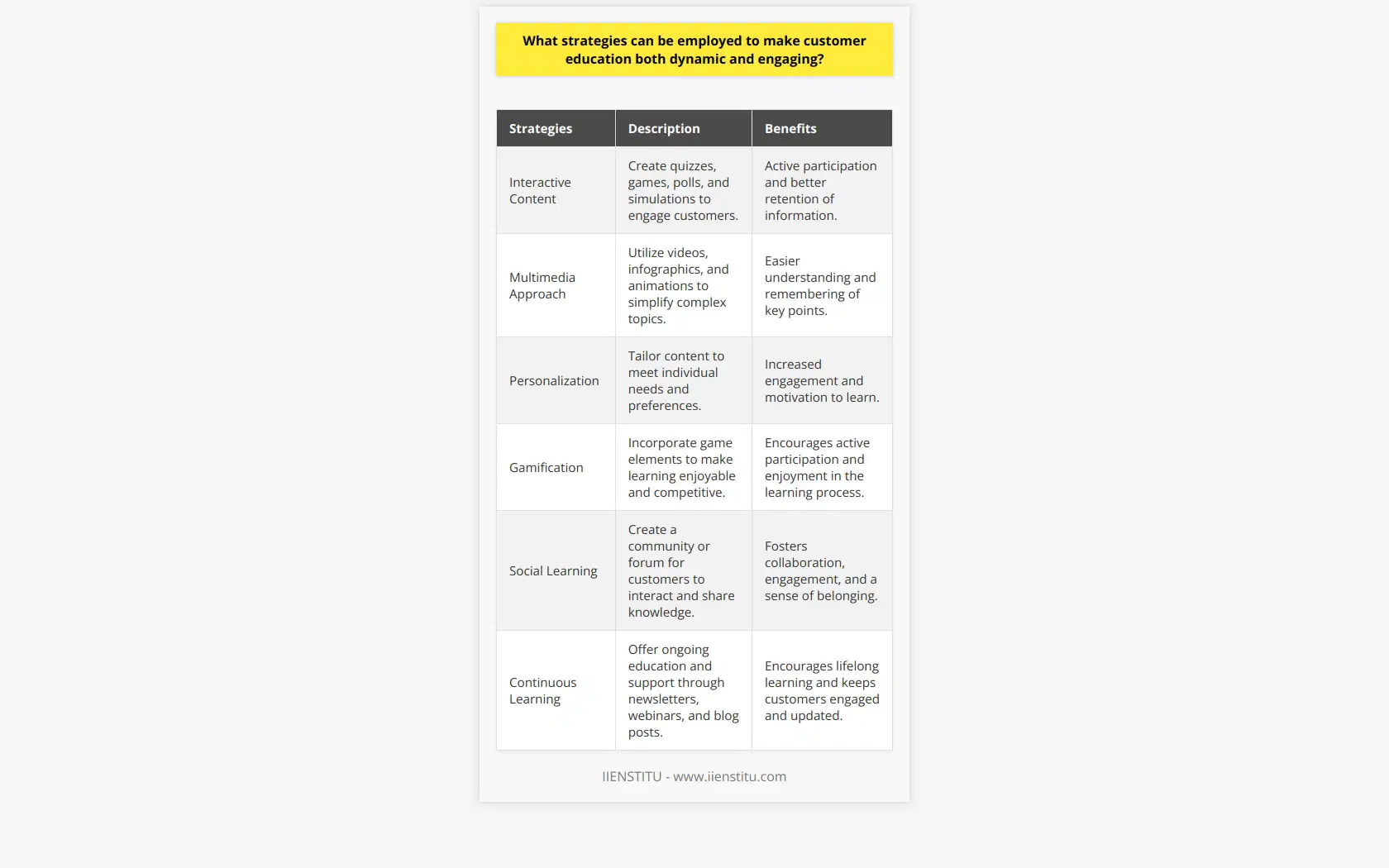
How can leveraging customer education positively impact customer loyalty?
Customer loyalty is an essential element of a successful business. As a result, understanding how to cultivate it should be a central concern for any organization. One way to increase customer loyalty is to leverage customer education. Customer education can provide customers with a greater understanding of the organization, its products, and services. The aim of customer education is to enhance the customer experience and provide customers with the necessary knowledge needed to use the company’s products or services. This can have a positive effect on customer loyalty.
Customer education can create greater customer understanding. Customers who have a better understanding of a company’s products or services are more likely to be loyal. Providing clients with a comprehensive understanding of what is being sold and how to use it will help to make a positive impression on customers. Additionally, it can help the customer to recognize the value of the products or services they are considering. By providing customers with the resources they need to make a decision, the company is demonstrating that it values the customer’s time and commitment. This is likely to lead to increased loyalty.
Furthermore, customer education is a great way to build trust. Trust builds loyalty, and trust is earned through education. By providing customers with the necessary resources and information to make informed decisions, the company is demonstrating that it values its customers and understands their concerns. Additionally, customer education provides a forum for customers to ask questions and receive answers in a timely manner. By taking the time to answer customer inquiries, the company is demonstrating that it cares about the customer’s needs and wants to provide them with the best possible experience.
Finally, customer education can help the company identify potential loyalty issues before they become a problem. By providing customers with the knowledge and resources they need, it is easier to identify any potential issues early on and address them before they become a problem. If customers recognize that the company is proactive in addressing their questions and issues, they are more likely to trust the company and remain loyal to its products and services.
In conclusion, leveraging customer education can have a positive effect on customer loyalty. Customers who understand the value of what is being purchased and have a comprehensive understanding of the company’s products and services are more likely to be loyal. Additionally, customer education helps to build trust and can help the company identify potential loyalty issues before they become a problem. Ultimately, customer education is an essential element of any successful business and should be integrated into any customer loyalty program.
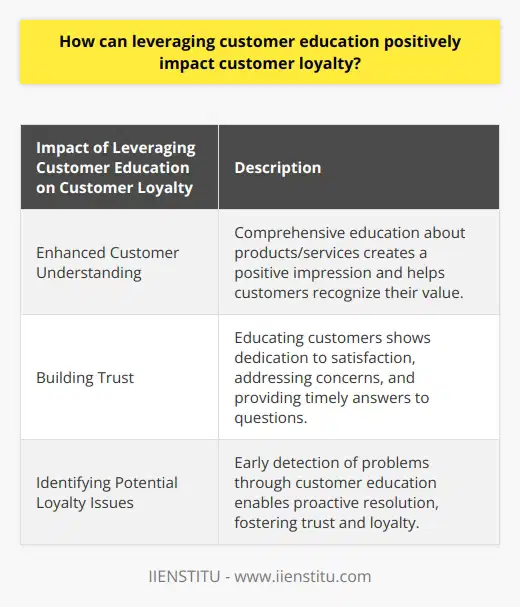
How can organizations effectively utilize customer feedback to improve their products and services for enhanced customer satisfaction?
Gathering Customer Feedback
Organizations can significantly enhance customer satisfaction by effectively utilizing customer feedback in improving their products and services. The first step entails collecting diverse opinions from customers through various channels, including online surveys, social media, customer reviews, and focus groups. By reaching out to a broad audience, organizations can gather comprehensive insights.
Analyzing the Collected Data
After amassing customer feedback, organizations should analyze the data to identify common themes and patterns. This analysis can reveal vital information about the needs, preferences, and expectations of customers. By understanding these elements, organizations can pinpoint areas that require improvement and prioritize their efforts accordingly.
Implementing Changes
Once organizations identify the potential areas for improvement, they should implement the necessary changes to products or services based on customer feedback. Collaborating with cross-functional teams, such as product development, engineering, and marketing, ensures the effective and timely incorporation of customer insights into the business processes.
Measuring the Impact
To evaluate the effectiveness of customer feedback-driven enhancements, organizations must establish metrics to track progress. By measuring customer satisfaction, sales growth, and customer retention or loyalty, organizations can determine if the implemented changes positively impact overall performance. Monitoring these outcomes allows businesses to adjust their strategies, if needed, to better meet customer expectations.
Continuous Improvement
Lastly, organizations should adopt a continuous improvement mindset by actively seeking and incorporating customer feedback into their business processes. This approach enables companies to refine and optimize their products or services consistently for heightened customer satisfaction. By being responsive to consumer needs, organizations build stronger relationships and foster long-term loyalty.
In summary, organizations can successfully leverage customer feedback to boost customer satisfaction by implementing a systematic approach that involves gathering customer input, analyzing the data, making necessary improvements, monitoring the results, and continuously refining based on customer insights. This comprehensive strategy ensures organizations remain attuned to customer needs, thereby enhancing overall satisfaction and cementing long-lasting customer relationships.
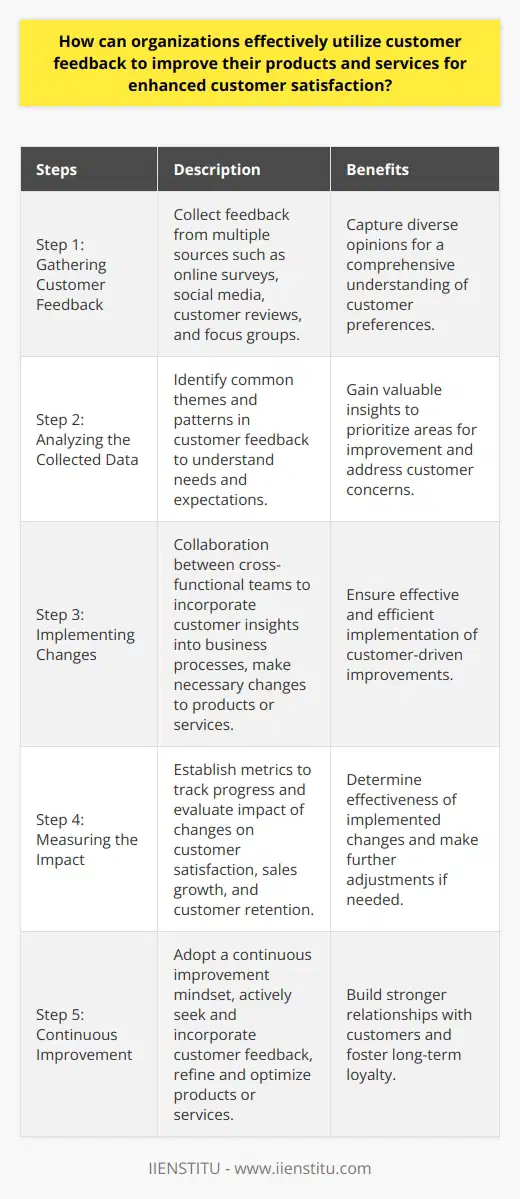
What role does effective communication play in fostering positive customer experiences and satisfaction?
Effective Communication: A Key to Customer Satisfaction
Understanding Customer Needs
Effective communication plays a crucial role in fostering positive customer experiences and satisfaction by facilitating a clear understanding of customer needs. By actively listening to customers' requests, businesses can develop strategies and solutions that cater to the needs of the customers, ensuring their satisfaction. Accurate interpretation and appropriate response to customer needs not only lead to customer satisfaction but also contributes to long-term relationships.
Building Trust and Confidence
Moreover, effective communication helps to build trust and confidence between businesses and their customers. Transparent communication of policies, procedures, and pricing encourages customer loyalty, whilst clear explanations regarding product features, benefits, and potential risks ensure customers feel informed and secure. Trust fosters loyalty, and satisfied, loyal customers are more likely to recommend a business to others.
Addressing Complaints and Issues
Another important aspect of effective communication is the ability to address and resolve customer complaints and issues in a timely and respectful manner. When customers feel their concerns are being taken seriously, they are more likely to maintain a positive outlook towards the business. Swift and appropriate resolution of problems demonstrates the business's commitment to providing excellent customer service, thus increasing the likelihood of recurring business.
Customizing Interactions
Effective communication enables businesses to customize interactions with customers, providing personalized experiences that contribute to overall satisfaction. By understanding individual preferences and using them to tailor products, services or interactions, businesses can create positive experiences that resonate with their customers. This customized approach also leads to a better understanding of the customer's expectations, allowing businesses to refine their offerings and services accordingly.
Adapting to Customer Feedback
Lastly, effective communication allows businesses to adapt and improve based on customer feedback. Receptive and open communication signals to customers that their opinions and insights are valued. In turn, businesses can capitalize on this information, using it as an opportunity for growth and development. Such adaptability not only results in increased customer satisfaction but also demonstrates a proactive commitment to continuous improvement.
In conclusion, effective communication is essential for fostering positive customer experiences and satisfaction, as it contributes to understanding customer needs, building trust and confidence, addressing complaints and issues, customizing interactions, and adapting to customer feedback. By prioritizing effective communication in all aspects of their business, companies can increase customer satisfaction, loyalty, and ultimately their overall success.
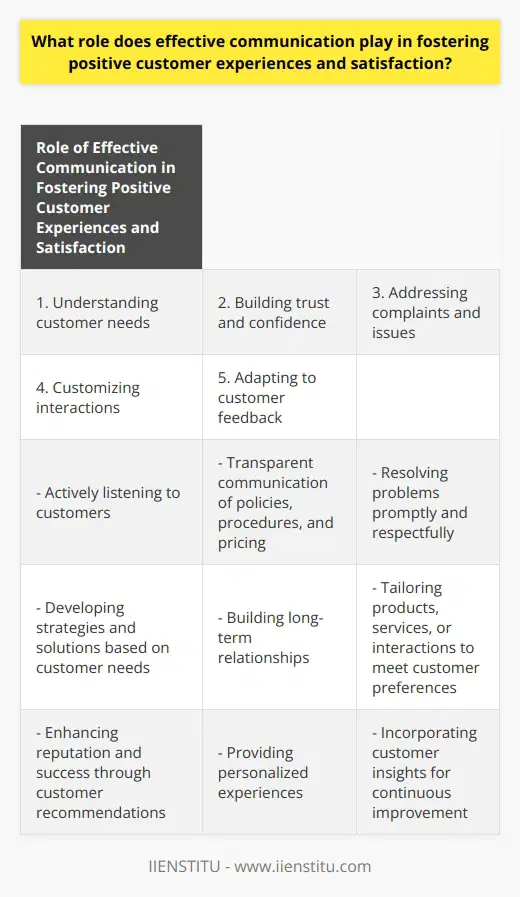
In what ways can personalization and customization of products and services contribute to increased customer satisfaction?
Understanding Customer Preferences
One key aspect of personalization and customization in products and services is the deeper understanding of customer preferences. When businesses tailor their offerings to the specific needs of customers, they demonstrate that they recognize and value their customer base. This investment in understanding customer preferences often results in increased customer satisfaction.
Creating Emotional Connections
Another reason for increased customer satisfaction due to personalization and customization is the emotional connection it creates with the customer. When customers receive products or services that align with their personal preferences, they are more likely to form positive associations with the brand. Establishing such emotional connections fosters a sense of loyalty, leading to greater overall satisfaction.
Offering Relevant Recommendations
An efficient personalized approach includes offering relevant recommendations to customers. The use of data analytics to identify customers' preferences and needs allows businesses to make suggestions that are more likely to resonate and appeal to them. This relevance not only increases the chances of customers purchasing suggested items but also ultimately contributes to greater satisfaction with the brand.
Encouraging Customer Retention
By providing personalized experiences and custom products to customers, businesses are more likely to foster customer loyalty. Satisfied customers are more likely to remain loyal to a brand, as their past experiences have provided them with confidence in the quality and value of the products or services. This customer retention, in turn, results in a positive feedback loop of increased satisfaction and loyalty over time.
Reducing Analysis Paralysis
When faced with an overwhelming array of options, many customers experience decision paralysis. Customizing and personalizing products and services can simplify the decision-making process and lead to better customer satisfaction. By reducing the stress associated with making decisions, businesses can empower customers to feel more confident in their choices, ultimately leading to greater satisfaction.
In conclusion, personalization and customization of products and services contribute to increased customer satisfaction in multiple ways: understanding customer preferences, creating emotional connections, offering relevant recommendations, encouraging customer retention, and reducing analysis paralysis. These strategies allow businesses to cater to their customers' needs and provide more enjoyable and fulfilling experiences, leading to higher levels of satisfaction.
